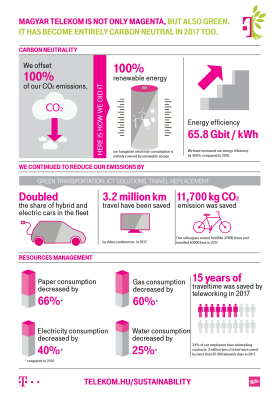Magyar Telekom Group: Three years in a row with carbon neutral operations – Telekom Group takes its share in the mitigation of climate change

One of the major challenges of our age is climate change which is mainly attributable to carbon dioxide and other greenhouse gas emissions. In line with the targets of Magyar Telekom’s sustainability strategy the company strives to reduce its energy consumption and carbon dioxide emission. In 2015 Magyar Telekom Group was the first Hungarian company, and was among the first European leading telecommunication operators that have become entirely carbon neutral: the company group’s carbon dioxide emission was zero. Thus the company’s carbon neutral operations contribute to the mitigation of climate change third year in a row.
By implementing environment protection developments, investments and innovative solutions in the past seven years (2010-2017) the company group reduced its electric energy consumption with 40%, natural gas consumption with 60% and water consumption with 25%. Another important measure was to increase the proportion of renewable energies within the total consumption. From 35 thousand MWh the company multiplied its use of green energy six times bringing it now to more than 201 thousand MWh. Along this effort in 2017 its energy efficiency rate increased above 65 Gbit/kWh which is four times more than it was in 2010. Through the digitalization of corporate administration and the introduction of multiple e-solutions the company reduced its paper consumption with 66% compared to 2010 and still continues to digitize the entire customer care activity. The company offsets its remaining carbon dioxide emissions by the purchase of green tags (i.e. supporting green projects).
In order to achieve carbon neutrality Magyar Telekom’s employees took part in the efforts as one. Since the launch of the company group’s TeleBike community bike service employees have chosen to ride on wheels on 38 thousand occasions instead of using other means of transportation to commute between the company sites within Budapest. They have travelled 63 thousand kilometers by bike thus saving 11,700 kilograms of carbon dioxide emission. Videoconference solutions have further contributed to the saving of more than in 2017 the company saved more than 3 million km travel in 2017, while the further increase in the proportion of hybrid and electric cars in the company fleet also contributed to its emission reducing efforts.
In 2018 climate protection remains a top priority for the company's sustainability activities. While preserving its achievements Magyar Telekom would like to call attention to the climate protection opportunities in the info-communication sector. The ICT industry is only responsible for a mere 2% of the worldwide carbon dioxide emission while using the services of ICT companies users could relieve the planet from 20% - 12 gigatons - carbon dioxide emission, which is 2000 times of Hungary's annual emission.
Besides its own climate protection measures Magyar Telekom would like to contribute to the climate awareness of its customers by eliminating the carbon footprint of all current Magenta 1 services between January 1 and December 31, 2018. This involves more than 150 thousand customers who - simply by choosing Magenta 1 - have taken steps for climate protection.
